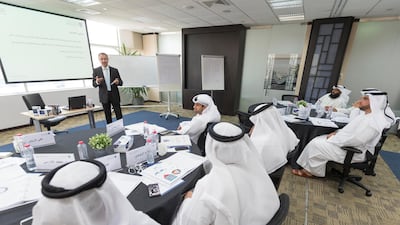"After two or three years, your ability to perform at Google is completely unrelated to how you performed when you were in school," Laszlo Bock told the New York Times, in a wide-ranging interview a few years ago. "You're fundamentally a different person. You learn and grow, you think about things differently."
Back in 2013, Mr Bock was the tech giant’s senior vice president for people operations. Under his leadership, Google conducted extensive data analysis on the qualifications and performance of its employees, which led him to conclude that test scores were more or less worthless as a hiring criterion.
With artificial intelligence already transforming industries such as banking, healthcare and transport, the discrepancy between industry needs and academic training is growing. But businesses are taking steps to adapt to this problem. Google – along with high-profile global companies such as Apple, IBM, Starbucks and the Bank of America − has recently announced that academic degrees are no longer mandatory to apply to some of its high-profile positions. Non-traditional vocational training, such as coding boot camps, and practical industry or research experience are now increasingly valued by employers.
One man who embodies this trend is Pascal Weinberger. He heads the AI department at Telefonica Alpha, the “innovation facility” of Spain’s biggest telecoms operator, set up in 2016 to “address some of the biggest problems in society by conceiving and delivering radical solutions and breakthrough technology”. His LinkedIn profile is filled with prestigious work and research experience, yet academic degrees are nowhere to be found. Whenever I have met Mr Weinberger, he has been passionate and has a rare, holistic way of approaching human behaviour, paired with a systemic approach to problem-solving. He clearly did not acquire these skills in university lectures.
Corporations are not alone in challenging the relevance of higher education. According to a survey conducted by NBC and the Wall Street Journal earlier this year, only 39 per cent of Americans between 18 and 34 years old now consider a four-year college education to be a worthwhile investment of money or time. This represents a 17 per cent drop on figures from four years ago.
So how can universities adapt to a job market that is changing so rapidly that even the companies looking for talent are struggling to keep pace? It's a question that is giving a serious collective headache to deans and professors everywhere.
Some institutions, however, are embracing change. Last week, the Mohammed bin Rashid School of Government in Dubai made public its decision to follow a learning-by-experience strategy. The goal is for students to no longer face traditional exams, but to be confronted with real-world problems and then be evaluated on their ability to solve them. This approach is closer to executive education programmes than a traditional university approach. It is hoped it will foster mental agility and adaptive skills, and better prepare students for their professional lives.
Some believe that such measures should be implemented earlier in the education process. Researchers from Hope College in Michigan investigated the effects of experience learning programmes in middle schools. They found that students in experiential programmes enjoyed school more, learned to successfully collaborate with others and progressed better in standardised tests.
In this month's edition of the scientific journal Development, Growth and Differentiation, researchers from the university of Niigata in Japan published an article focusing on experience-dependent regulation in juvenile brain development. It underscored the vital role that environmental stimulation plays in shaping the primary neural networks of children and suggested that the earlier students are exposed to experiential learning, the better.
However, new brain-imaging technologies have shown that experience-dependent neural plasticity − the ability of our brains to change structurally and functionally − can be also observed in adults, which just goes to show that it is never too late to change the way we learn new skills.
There is much speculation as to what the world of work will look like in 20 years’ time, but the truth is that we simply don’t know. That is why it is vital for students to develop agile, creative minds and hands-on, practical skills. As the old saying goes, there’s nothing like learning from experience.
Professor Olivier Oullier is the president of Emotiv, a neuroscientist and a DJ


